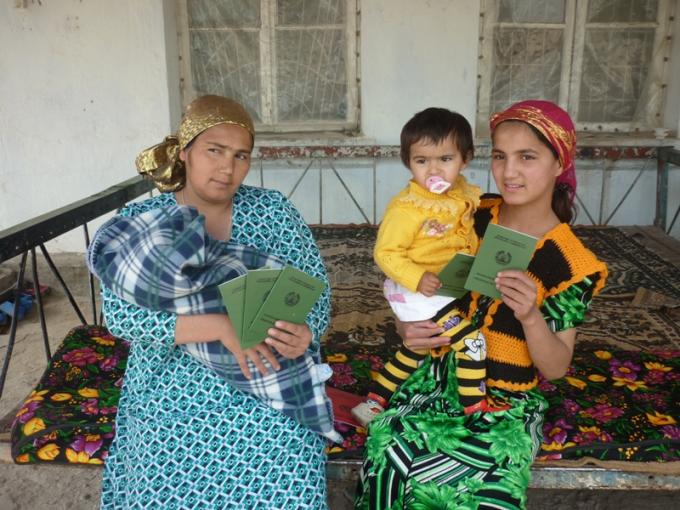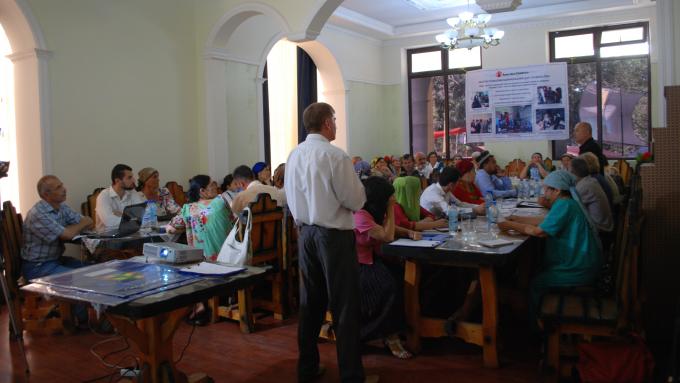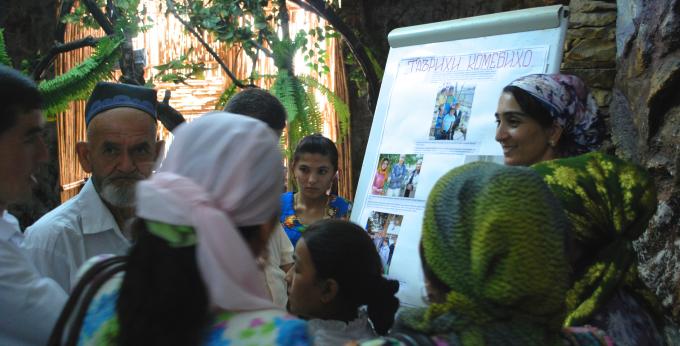Birth Registration Project Final Workshop
On July 30th 2014, a final workshop was held in Qurganteppa, in South Tajikistan, gathering over 40 stakeholders, including beneficiaries, local authorities and representatives of the primary health care centres and of the civil registration centres. In Tajikistan, birth certificates are required by law to establish the legal status of children and access government services, such as health and education. 2013 UNICEF report highlighted that 12% of children under-five have not been registered in Tajikistan. Save the Children assessment in target districts reported a higher 24%.
After one year and half of activities in the field and before project’s closure, Save the Children’s workshop presented the achievements of the project, while participants highlighted the positive impact in their communities. The project covered 94 villages in 2 districts, linking authorities and communities in the interest of children. Data reported by the civil registration centres and confirmed by Save the Children evaluation, demonstrates the effectiveness of the project with an average 24,1% of increased children who now have birth certificates. “It is evident for us that in the last year more parents are applying to receive birth certificates for their children. Here I see the contribution of the project”, said Mr. Inoyatsho Rahimov, employee of the Civil Registration Office in Tojikobod Jamoat, Vakhsh district, and he continued, “I would like to thank Save the Children for implementing the project in our area”.
The final workshop presented the main activities of the project to a broader audience through photos stories and media coverage: training of trainers to villages’ leaders and parents spread the word about the importance of birth certificate in the communities; role plays, competitions, performances conducted by school-children and active women informed communities about UNCRC and birth registration; explanatory activities brought the project where people are in schools, in the field, in the street, in the markets; through child-to-child activities, children were directly asked to take responsibilities to increase awareness on UNCRC rights.
“We have 15 trained Child-to-Child trainers at our school who are teaching the articles of the UN Convention on Rights of the Child to their peers”, said Ms Abdunazarova Sadfmo, teacher of the secondary school #6, “we had a well-ended story: a pupil of grade 6, Nargis, had been forced to live with her father as she was unaware of her right to be entitle to live at her discretion with any of her parents. After the Child-to-Child training, she decided to claim her right and she is now living with her mother”.
The project raised the awareness of local authorities on issues linked with birth registration, such as school planning, vaccination schedule for children and data validity on child mortality rate:
“Education and health structures’ plans are based on child registration statistics. Vaccines or other drugs are ordered, procured and distributed to health facilities considering the number of newborns registered” Mr. Khudoyberdiev Hakim, representative of the Ministry of Health said during the workshop, “as a result a number of children might be left without vaccines and child disease outbreaks will more likely to happen. Accordingly, unregistered babies might decrease the infant mortality rate in the country, garbling the actual statistic data”. An uncommon acknowledgment, which is very important to hear for Save the Children’s work.
As the only organization in Tajikistan advocating a child’s right to have a birth certificate, Save the Children hopes to scale-up the project in other districts in the country. The project “Improving Access to Health Services through Birth Registration” was supported by Save the Children Netherland.
 Central Asia
Central Asia 

